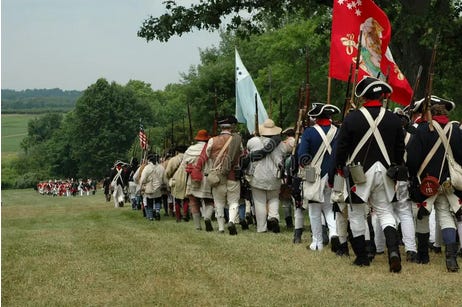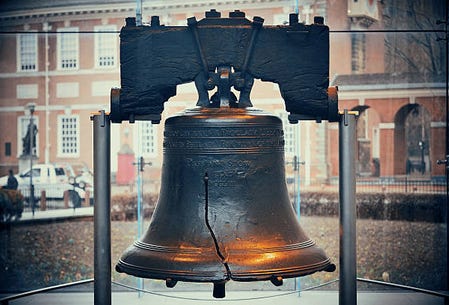FREEDOM
Here in the United States we, as citizens, will tell anyone, anywhere, at any time how great it is living in the “land of the free and the home of the brave.” We say it because we believe it, and for the most part it’s still true.
For the most part. We’re in the throes of a revolution, one that does not always involve guns, but sometimes does. There is certainly violence associated with this revolution, and we’re not only talking of kinetic action by one side or the other. We’re talking of the violence of incompetence as well; the violence we’d seen in Russia under the Soviets and should have known would happen here under the same conditions.
Well, we’re duplicating the Soviets with DEI. When we decide that a person’s color, religion, national heritage or sexual preferences are more important in filling a job than experience and knowledge then we’re duplicating the incompetence that caused the downfall of the CCCP.
Yet we will tell anyone we’re a free people. Are we wrong? The answer here is yes and no. We’ll start with the no side first.
No, we’re no longer as free as our fathers and grandfathers were. Our ancestors weren’t burdened with the regulations we suffer under, they didn’t have anywhere near the number of laws we have to obey, and they didn’t have the ignorant, selfish, incompetent politicians we have today. Don’t misunderstand, there were always incompetent politicians. There were even corrupt politicians, but they didn’t do near the damage that a corrupt politician – or any other corrupt leader – can do today.
Also, in a tongue-in-cheek defense of the old time robber barons – the Bill Gates and Warren Buffets of the 19th century – they had a sense of giving back. They built libraries, and funded charities, and most of their largess was aimed at making the common man better off, more educated, and safer. The robber barons of today spend their obscene fortunes on things like farm land so they can control food in the future, and on DEI in the mistaken effort to make people equal via equity rather that equal opportunity. Today’s robber barons are looking to introduce more socialism and less freedom into the United States.
The government has been militarized to enforce the administration’s plans and selectively enforces or fails to enforce the law as is convenient for the powers-that-be. This whole prostitution of government makes us less safe, less financially secure, and less free.
One who read only the “no” answer to the questions would be, at best, depressed about the state of freedom in the US. We recommend that you continue to read as a way to cure your depression and restore your faith in the last best place to live.
You must know the dark to recognize the light. The “yes” answer to this question is a lot easier to explain than the “no” answer. The yes answer is “The First and Second Amendments to the Constitution.”
The First Amendment reads:"Congress shall make no law respecting an establishment of religion, or prohibiting the free exercise thereof; or abridging the freedom of speech, or of the press; or the right of the people peaceably to assemble, and to petition the Government for a redress of grievances."
Simple language, easy to understand, with only one meaning, no matter how some people try to change it. It doesn’t mean what they want it to mean, only what it actually means.
The First Amendment does not forbid religious activity by a government entity, nor does it require the separation of church and state, except that the state cannot establish a state religion – example the Church of England was and is the state religion in the UK and is headed by the monarch. In addition, the “separation of church and state” that is so widely quoted by those who would limit religion, does not appear in any legislation, nor in the Declaration of Independence, nor the Constitution. “Separation of church and state” only appears in a letter from Thomas Jefferson to the Danbury Baptist Association in 1802. As much as we honor and revere Thomas Jefferson, things he wrote in letters are opinion, not law, and although he outlined a desirable but not codified principle, and most Americans believe it is true, it was Jefferson’s opinion, based on his knowledge of the law.
The First Amendment says you can form your own religion if you want to, and no one can stop you from participating in your religion. You are free to say anything you wish to say, understanding that there are laws which protect people from slander and libel, and even though you are free to say what you wish, there can be consequences for some speech. Other speech is forbidden – yelling fire in a theater for example – due to inherent danger to others if you do. Freedom of the press is guaranteed as well. This means the press – once was only newspapers, but now means electronic media, TV, radio, internet blogs, and a myriad of other ways to transfer information – has the right to publish what it wishes to without government interference. There was a time in this country when you had newspapers that espoused specific, sensationalist styles of reporting – think the National Enquirer – versus the staid, old style newspaper – think the New York Times before it became a tool of DEI.
There is also an issue that will require reasonably quick resolution, and that issue is “who is actually the press?” It was once only newspaper reporters, but now, aside from all the media “reporters” you also have the blog and substack publishers who arguably are as much the media as the largest publishers, yet in many instances these small, one-person shops are not credentialed or allowed access as more traditional media are and yet they find and publish real news.
There is a problem with the freedom to assemble, as, depending on what your assembly is talking about the government may take steps to prevent or punish you. From one side the January 6 protesters were tricked by the government into entering the capitol, and from the other side they were an insurrection. Antifa and BLM were, from one side, burning and destroying inner cities, while from the other side they were protesting for their rights. We present these as examples, not as judgments of right or wrong.
When the First Amendment says you have the right to petition the government to redress grievances, it means exactly that. If you believe the government has done you wrong, you can take it to court for relief.
The Second Amendment is even simpler than the First. “The Second Amendment to the United States Constitution is part of the Bill of Rights, which was ratified on December 15, 1791. It states:
"A well regulated Militia, being necessary to the security of a free State, the right of the people to keep and bear Arms, shall not be infringed."
In all interpretations of the Second Amendment, the meaning is that citizens should be armed in order to remain free and to fight a tyrannical administration, e.g. the purpose is to insure proper weaponry is available if the need to replace the government arises. The Second Amendment protects an individual's right to own and possess firearms for self-defense, including the militia function, hunting, and other lawful purposes. Advocates of this interpretation argue that the phrase "the right of the people to keep and bear Arms" emphasizes an individual right, separate from any militia service requirement. Others believe the Second Amendment, by virtue of it’s provision of weapons to aid in removing a tyrannical government, the people have a right to own any weapon the military has. We won’t comment on that definition of the Second Amendment, but find the reasoning sound.
So that’s the First and Second Amendments, the reasons we are the freest country in the world. The answer’s still a resounding yes, and with diligent application of our rights, we can be freer and the answer yes will be louder still.





